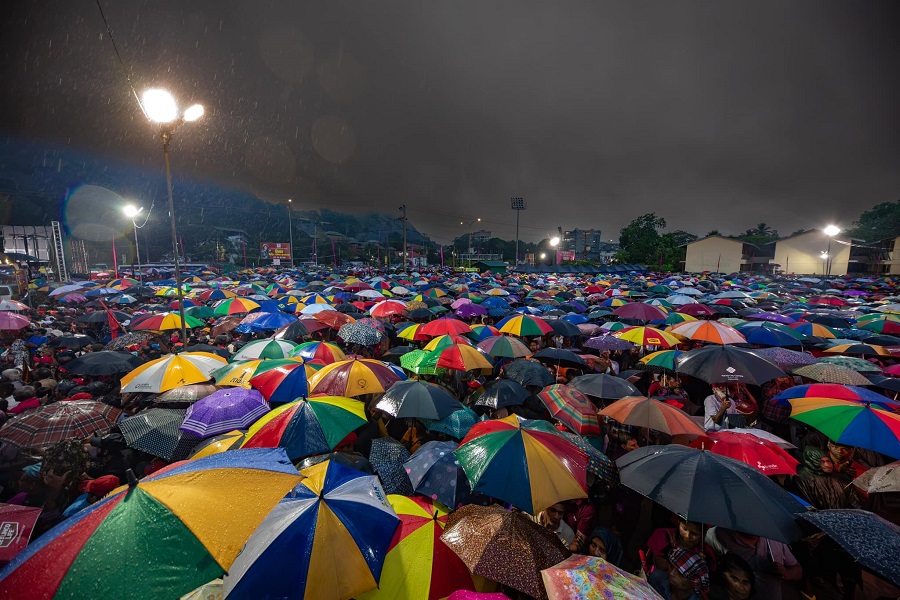-By LeN Political Correspondent - (for the first anniversary of 'Anurella')

(Lanka-e-News - 17.Sep.2025, 11.10 PM) When Sri Lanka looks back on its 2024 presidential election, one campaign will stand apart—not simply for its victory, but for the way it redefined politics on the island. The rise of Anura Kumara Dissanayake, affectionately nicknamed Anurella, was less a campaign than a movement, built on the promise of a “rich country, a beautiful life.”
What made it remarkable was not the scale of its rallies, nor the meticulous logistics. It was the way the message cut across divisions that had scarred Sri Lankan politics for decades.
From the start, the NPP campaign broke with tradition. Its speeches were not a laundry list of promises; they were a direct conversation with a people battered by economic collapse, corruption and decades of elite domination.
On 22 August 2024 in Dargah Town, Anura addressed Muslim communities directly, promising that under his presidency minorities would not be sidelined. On 5 September in Jaffna, he delivered what many Tamil voters later called the most sincere address by a Sinhalese leader in living memory—his speech translated into Tamil, framed in respect for local traditions. For the first time, a majority of Tamils cast their ballots for a non-Tamil candidate.
On 16 September in the hill country, he told upcountry Tamils—long treated as outsiders—that they were Sri Lankans, not Indians. “You were born here, and this is your country,” he declared, winning unprecedented support among communities who had rarely trusted Colombo.
Crowds were striking not only for their size, but for their composition. Women—housewives, professionals, garment workers—turned up in their thousands, joined by youth and working-class men who had once dismissed politics as futile. Unlike the choreographed rallies of Sri Lanka’s dynastic parties, these gatherings felt participatory. People waited hours to hear Anura speak, and left convinced he spoke for them.
Behind the scenes, the campaign was masterminded by JVP propaganda secretary Vijitha Herath, now foreign minister, working with a nationwide committee that mapped rallies in every province—north, east, west, south and central.
The transformation of the old JVP into the broader NPP gave professionals, businesspeople, and first-time activists a platform to join forces. Thousands of volunteers worked day and night, knocking on doors, handing out leaflets, and creating social media content that carried the slogan of a “rich country, a beautiful life” into every household.
The campaign did not stop at Sri Lanka’s borders. Anura travelled to Dubai, London, the US, Canada, South Korea, Japan and even the Maldives to meet the diaspora. Those meetings reverberated back home: families in Sri Lanka heard from relatives abroad that Anura represented hope.
International recognition also mattered. Diplomats from China, the US, Britain and the EU queued at the JVP headquarters in Pelawatte to meet the candidate. India, sensing the tide, invited him and his team to Delhi before the vote. For the first time in decades, a Sri Lankan opposition leader was treated as a statesman-in-waiting on the world stage.
The brilliance of the campaign lay in its simplicity. Unlike the Rajapaksa dynasty, which relied on fear and patronage, or Ranil Wickremesinghe, who leaned on technocratic promises, Anura told ordinary Sri Lankans: your life can be better, and you deserve dignity.
It was not a politician’s speech—it was a neighbour’s reassurance. In a country where families queued for fuel, where wages evaporated under inflation, and where corruption corroded trust, that message resonated.
On election day, the results confirmed what the rallies had foreshadowed. Sri Lankans, across ethnicity, class and region, voted for change. Tamil voters who had never supported a Sinhalese candidate, Muslim communities sceptical of Colombo, and the Sinhala working class long manipulated by patronage, all converged in the NPP column.
Observers still marvel at the achievement. How did a leftist candidate outflank the incumbent president Ranil Wickremesinghe and the entrenched Rajapaksa family? The answer lies in a campaign that spoke not only to anger, but to aspiration.
Since then, Anura’s presidency has been hailed as the beginning of a democratic revolution. But his campaign will be remembered as the blueprint: one that fused grassroots energy with diaspora networks, local speeches with international diplomacy, and the discipline of JVP volunteers with a message of hope.
For many Sri Lankans, Anurella was more than a nickname. It was a symbol of possibility—that politics could be about the people, not the privileges of the elite.
-By LeN Political Correspondent
Related Articles
* 'Anurella'..! How Sri Lanka’s Ballot Box Sparked a Revolution - (Part 1)
---------------------------
by (2025-09-20 18:33:34)
Leave a Reply